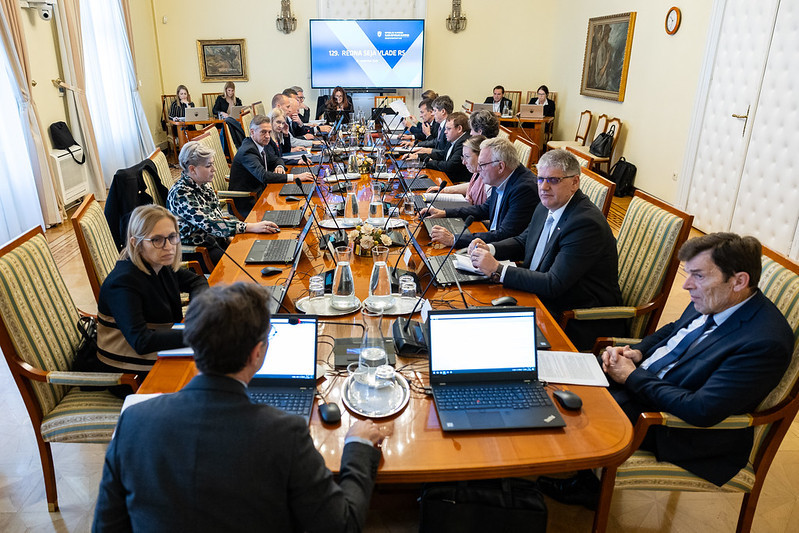155th regular session of the Government of the Republic of Slovenia
With the proposed new amendments to the Kindergartens Act, the Government is pursuing the goal of providing the conditions for high-quality preschool education, which lays foundations for the healthy and optimal development of children. The amendments address the deficiencies in the current arrangement and strengthen the role of the public kindergarten network in Slovenia. A high-quality preschool education has a positive effect on many aspects of child development and learning. Children's cognitive, social, emotional and physical development is fast in the early years of their lives, which means that these years are crucial for their later development. A common European Education Area target set in the 2021 strategic framework on education and training is that at least 96% of children between 3 years old and the starting age for compulsory primary education participate in preschool education by 2030. Slovenia has been gradually approaching this target. In the 2023/24 school year the participation rate was 93.6%. The aim of the amendments to the Kindergartens Act is to modernise the sector by addressing the shortcomings identified in practice, strengthening the public preschool education system, and introducing solutions for encouraging children from vulnerable groups to participate in preschool education. In order to ensure a timely kindergarten enrolment of children from vulnerable groups or children with special educational needs, a new clause is included in the Act stipulating that after a child reaches 5 years of age or in the year before they start primary school, the competent social work centre may decide on the child's enrolment in kindergarten. After an assessment, the centre issues an opinion that in the year before starting primary school, the child should attend at least a short programme of 240 hours per year. If this recommendation is not followed, the centre may take further measures as laid down by the Family Code. The new amendments also establish a legal basis that allows decisions on the enrolment in or withdrawal from kindergarten to be made by only one parent if they present a certificate issued by a social work centre confirming the other parent's violent behaviour.
Today, the Government also approved the amendments to the Prevention of Money Laundering and Terrorist Financing Act (ZPPDFT-2). The amendments introduce changes regarding access to the data in the register of beneficial owners. All obliged entities referred to in Article 4 of the ZPPDFT-2, law enforcement authorities, courts, supervisory authorities referred to in paragraph one of Article 152 of the ZPPDFT-2 and all state authorities will still have full access to the data in the register when deciding on the rights of entities that have financial consequences for the state budget. Access to the register will also be allowed to natural and legal persons if they demonstrate a legitimate interest, subject to an application to the Agency of the Republic of Slovenia for Public Legal Records and Related Services.
The amendments more clearly regulate access to the data in the beneficial owner register in procedures related to the use of EU and national budget funds. They also change the status of honorary consular officers, so that when the amendments enter into force, they will no longer be considered politically exposed persons. The amendments expand the group of feedback recipients to entities that have not submitted a report but have been asked to provide data. This establishes a basis for improving the efficiency of supervisory authorities.
The Government finalised the text of the draft Resolution on the overall long-term programme for the development and equipping of the Slovenian Armed Forces until 2040, which is the most important development, guidance and planning document and sets out plans for the long-term development and equipping of the Slovenian Armed Forces, so that it can perform its statutory duties and provide forces and capabilities, and is prepared for pursuing national interests and defence goals. Normally, such a resolution is drafted every four years. It must be drafted after a strategic defence review, after the adoption of a new resolution on the national security strategy of Slovenia or in any other circumstances that require a change in the long-term framework for the development of Slovenia's defence capabilities. On 22 March 2023, the National Assembly adopted the Resolution on the overall long-term programme for the development and equipping of the Slovenian Armed Forces until 2040. Since then, the Government has adopted new defence, military and civil defence strategies of the Republic of Slovenia. Other circumstances have also arisen which require a more ambitious, in terms of content and time, general long-term framework regarding the defence resources and bases for the development of defence capabilities of Slovenia. The Government needs and intends to ensure a faster timeline and more ambitions investments in defence and resilience, which will reduce the gap in the field of defence caused by inadequate past investments. This will achieve a positive quality leap in the development of national military capabilities and higher levels of readiness and resilience of Slovenia's entire defence system. The new resolution introduces an integrated approach, which, in addition to an increase in future defence expenditure and considerable investments in the modernisation of the Slovenian Armed Forces, also envisages coordinated national efforts to further develop and strengthen the national defence industry and improve general resilience of the country and society, including by investing in various projects and dual-use capabilities and through a proactive and coordinated approach to strategic communication concerning resilience, security and defence. The planned national efforts will contribute to Slovenia's credibility among NATO allies and EU Member States. Current discussions at the highest NATO and EU political levels clearly indicate the need to step up defence spending and investments. These pledges will be formally confirmed at the next NATO summit in The Hague and in the European Council's conclusions.


